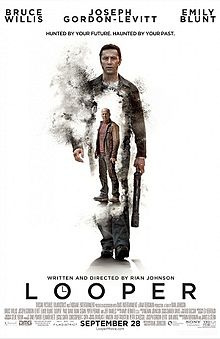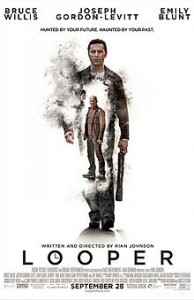Looper (film)

The premise of ‘Looper’ is fairly straightforward: In the future, time travel is possible but it is outlawed. A criminal organisation uses it to send people to the past (before time travel has been invented) to be killed and disposed of without a trace. A looper is a killer who works for this organisation in the past. He is called a looper because eventually the person he kills is his future self, thereby closing the loop. When the looper kills himself he gets a huge payout and lives comfortably for the rest of his life until such time as he gets sent back in time to be killed. This is presumably so the mob have no loose ends.
I have a fair few problems with this. Firstly, why would you need a looper to know he killed his future self? None of his other targets are identified. Except for the payout of gold bars, the looper would never know that the person he just killed was himself so why tell him? Just keep using him and then retire him. Get another looper to kill the future self, who cares?
The second, quite major, problem is the time travel element. Now, I’ve heard a lot of talk about ‘Looper’ and I can generally put the audience into one of two camps: action movie and sci-fi. I tend to find that the action movie audience like the movie a lot more, they find it cerebral without being too taxing with enough shoot ’em ups to make it a pretty good film. They believe they have a grasp of the sci-fi element.
The sci-fi camp are less impressed. They understand all the concepts of time travel presented in the film but they don’t buy it because writer/director Rian Johnson has chosen to use a few theories in the one film and those few theories cannot coexist.
For example when one looper, Seth, fails to close his loop the gang hunts him down and then carves an address into his arm, knowing that his future self will bear the scars. As old Seth makes his way to the address, bits of him disappear—a foot, his nose etc—because the gang is hacking off bits from young Seth. Now if young Seth has all these deformities, how does he then grow to be old Seth, who is able to run from the young Seth when he is sent back in time to be killed? You cannot have a ‘one timeline’ theory (old Seth being affected by young Seth’s amputations) and a ‘many worlds’ theory (old Seth, who originally closed his loop successfully and went on to live a good life and this situation, where young Seth does not close his loop successfully so therefore cannot go on to live the life that old Seth has evidently already lived) coexist.
So this is a really bothersome part of the main story in which one version has young Joe (Joseph Gordon-Levitt) close his loop and grow up to be old Joe (Bruce Willis) and a second version in which young Joe fails to close his loop and has old Joe beat him up and escape.
When the two later meet in a cafe old Joe tries to explain things by saying his ‘memories’ are vague and are full of possibilities rather than concrete recollections. The only things that are clear are the things that young Joe has already done, not the things young Joe is about to do.
This is problematic because at the end of the film young Joe kills himself to prevent old Joe from existing to threaten a mother (Sarah) and her son Cid, a future threat to old Joe. Except if we go by the ‘one timeline’ theory this means that old Joe should not have existed at all to come back to threaten the two. Only, young Joe would never have killed himself if old Joe hadn’t come back and set all these events in motion, in which case we are dealing with a ‘many worlds’ theory. But in that case, young Joe killing himself would not have an effect on old Joe, who would have come from another ‘version’ of young Joe, one who had successfully closed his loop to become old Joe. GAH!
Even more problematic is the idea that young Joe has clearly made up his mind to protect Sarah and Cid and yet this understanding of the two has no effect on old Joe’s decision to kill Cid, which proves that this old Joe is not derived from the young Joe we have followed throughout the film.
As for Sarah and Cid, the son is creepy and Sarah sleeps with young Joe for no apparent plot consequence. Also, the fact that they are telekinetic feels tacked on, even though telekinesis was introduced at the start and becomes a big deal as young Joe learns the consequences of Cid’s powers.
All in all, the film appears all slick and macho and brainy but is actually a kind of mess. The only thing saving it is the performances by actors who probably didn’t question Johnson’s multiple uses of time travel theory too much and therefore gave a straight performance.
Film rating: 7/10 – actually quite a decent action film if you forgive all the time travel nonsense.
Enjoyment rating: 5/10 – except I didn’t forgive it.

This comment has spoilers.
The theory of time travel in Looper is not so different to the one in Back to the Future. It’s also rather silly, which was more excusable in a comedy.
Imagine a god of temporal consistency is looking over the universe. Whenever something happens which makes the world inconsistent, like someone getting a tattoo their future self doesn’t have, the god steps in and does repairs.
Now the god knows that what it really should do is rerun the universe from the moment of the change. But that sounds like work and the god can’t be bothered. It only needs to do an adequate job that the supervisor god won’t find inexcusably shoddy.
So the god patches things up, well enough for government work, making the smallest change it can that will restore the most visible parts of universal consistency.
The god is lazy and its supervisor is even more lethargic. The supervisor never bothers to look inside anyone’s brain so memories are left intact. Nor does the supervisor god bother to look through the history and complain someone couldn’t have run so far with no feet. Only the most obvious smoking guns are cleaned up.
The god’s standards of what is a big or a little change, and what’s an obvious or an inobvious inconsistency, are those of humans watching a movie not of physicists.
I think a major problem with Looper is that by any reasonable interpretation of the time travel rules old Joe should be very solicitous of young Joe’s welfare. But in fact his efforts to keep his younger self alive are desultory.
The morals of the story confused me. There seems to be a feeling that the kid, while presently innocent, is in danger of growing up to become a monster. But the description of the monster doesn’t sound all that bad by macho action movie standards – the only people we know he’s killing are mass murderers. Young Joe is comfortable with mass murder for hire but not happy about letting his friend get killed, it’s not obvious what he is willing to do or what he regards as a good life path for the kid. The writers might have profited from watching Dexter Morgan discuss Harry’s code.